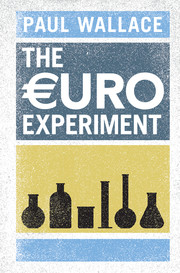1 - A question of survival
Published online by Cambridge University Press: 05 December 2015
Summary
In January 2009, ten years after the single currency had been founded, there seemed ample cause to celebrate in Brussels, the uncrowned capital of Europe, and Frankfurt, home of the European Central Bank (ECB). The euro was a club that other states wanted to join. Starting as a monetary union of eleven, it had expanded to sixteen, with Slovakia the latest to become a member. More important, the euro had withstood the gravest test of its first decade, the financial crisis that came to a climax in late 2008; despite its tender years, the ECB won plaudits for its prompt response when the crisis started in the summer of 2007, whereas the three-centuries-old Bank of England was rebuked for being slow off the mark. In troubled times, the single currency appeared to offer a security sorely needed by European countries that had shunned it, such as the UK whose banking system had come close to collapse. Jean-Claude Trichet, the ECB's president, described the euro as a ‘shield’, saying that in its first ten years it had ‘proven its stability, its resistance to shocks and its resilience in the face of financial and economic turmoil’.
The verdict of the European Commission when publishing a study in May 2008 that examined the decade since the first eleven members of the club had been selected was grandiloquent. Though the findings of the actual report were more nuanced, the Commission proclaimed the euro ‘a resounding success’; the monetary union was ‘an achievement of strategic importance’ not just for the wider European Union but for the world at large in which Europe had become ‘a pole of macroeconomic stability’. A sense of complacency persisted among the euro-zone elite in 2009, even though bond markets signalled alarm early in the year about Greece and Italy. In December, the Commission published a study that surveyed the mostly sceptical views of American economists as the drive to create an economic and monetary union (EMU) gathered momentum in the 1990s. Martin Feldstein, an economist at Harvard University and a former economic adviser to Ronald Reagan, had even speculated that the venture could spur renewed conflicts in Europe. The told-you-so title of the paper was: ‘The euro: it can't happen. It's a bad idea. It won't last.
- Type
- Chapter
- Information
- The Euro Experiment , pp. 1 - 29Publisher: Cambridge University PressPrint publication year: 2015



